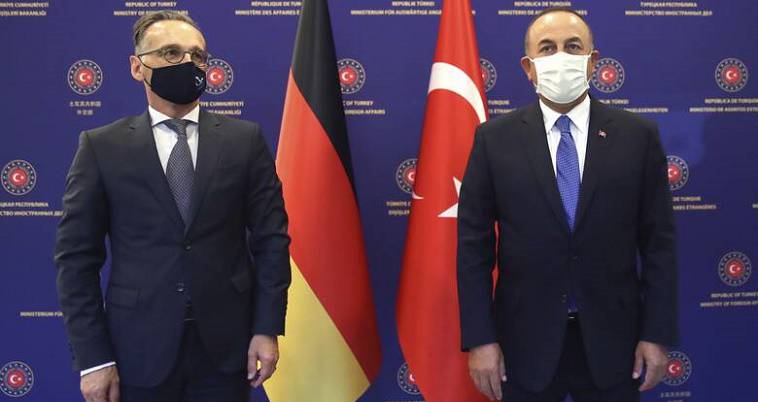Vaggelis Sarakinos: Cavusoglu’s threats canceled Maas’ message to Erdogan
19/01/2021
German Foreign Minister Haiko Maas is in Ankara for contacts with the Turkish political leadership, a week before the start of Greece-Turkey exploratory contacts. At the same time, the European messages to Erdogan are increasing and Athens is setting conditions for a meeting with Mitsotakis. Cavusoglu, however, continues the threats, sending his own message, that is, that nothing has changed.
Of course, interest is focused today on the German minister’s visit, as it is known that Berlin does not want to further disrupt Ankara’s relations with Europe. After all, Germany has been in favor of direct talks between the two countries from the beginning, constantly giving Erdogan space and time during its six-month EU presidency in order to de-escalate tensions. At the same time, of course, it promoted the full-fledged Ankara-Athens dialogue and, more recently, the idea of the International Conference on the Eastern Mediterranean.
Departing for Ankara, where he met with his counterpart Cavusoglu, Maas stressed that “the game with fire must not be repeated” in the Eastern Mediterranean, noting that Turkey, as a NATO partner, “has a clear obligation to resolve even difficult disputes through negotiation, with respect for International Law and not to endanger peace in the region “.
Maas’ message to Erdogan
The German Foreign Minister also added that his visit was aimed at encouraging his Turkish counterpart “to resolutely continue the constructive course of recent weeks”, reiterating that Berlin was “explicitly” in favor of resuming exploratory contacts that had stopped in 2016. Once more hailing recent developments, he described as a “positive message” from Ankara the “early termination of seismic surveys off Cyprus with the withdrawal of the research vessel” Barbaros “.
Maas had canceled a visit to Turkey last October, when Ankara re-launched the “Oruc Reis”, although earlier, during his visit in late August, he had not done much. He just listened, almost silently, to Cavusoglu and Erdogan launching threats against Athens and Nicosia. Today, however, he sees positive developments, most recently the departure of “Barbaros” from the Cypriot EEZ.
Of course, Erdogan is accustomed to projecting a mask of compromise before meetings and contacts of an international nature. He had done so with the withdrawal of the “Oruc Reis”, shortly before the EU Summit in December, and it is doing so now with the withdrawal of the research vessel from the Cypriot EEZ, a few days before the start of exploratory contacts.
But what the Turkish leadership did not do in December, and does not do today, is to stop its aggressive rhetoric against Greece and the Republic of Cyprus. Just the day before yesterday, and even when Erdogan appeared open even for a meeting with Mitsotakis, Cavusoglu, possibly for internal consumption, told reporters accompanying him on his return from Pakistan that if the talks did not cover all issues, there is no reason to hold the talks.
The Turkish minister continued Ankara’s constant pursuit of bypassing Greek terms and widening the agenda, imposing non-existent issues on the debate. And this at a time when Athens is saying at the highest level (Mitsotakis-Dendias) that the talks will concern the one and only difference with Turkey, namely the issue of the continental shelf of the islands and the definition of maritime zones.
Cavusoglu clicked “delete”
He did the same today, again in the presence of Maas, again accusing Greece of “unjustly claiming sea space on an island two kilometers from Turkey”, referring to Kastellorizo. The Turkish Foreign Minister, with non-existent allegations, also claimed that Athens “speaks of international law but does not implement the rulings of the International Court of Human Rights” in Thrace, adding that the Muslim population there should be called Turkish.
Of course, he continued the threats that if Greece does what it wants, we will not only have an accident, but Ankara will do what it should. “Greece should not be influenced by other countries and hold exercises wherever it wants, and other steps, otherwise we will not only have an accident but we will do what we have to do,” he said characteristically.
A message to Turkey, with barbs against the Erdogan government, had been sent earlier by the Commission, through its representative for Foreign Affairs. Asked about the course of Euro-Turkish relations, Peter Stano stressed that what is important for the EU is “to translate statements into action”. He even spoke of “fixed acts”. A view that is close to the basic Greek position, that in order for there to be a dialogue, Turkey must show “continuity and consistency” in the direction of de-escalating the tension and ending the unilateral actions.
At the same time, the Greek government, responding to Erdogan’s opening for a meeting with the prime minister, said through its representative that such a thing could be done only after the exploratory contacts and if there is convergence. He even clarified that this convergence should concern the issue of the delimitation of the EEZ and the continental shelf in the Aegean and the Eastern Mediterranean. However, with his statements, Cavusoglu not only canceled this perspective, but also all the European initiatives, with of course the first being Maas’ visit to Ankara.





